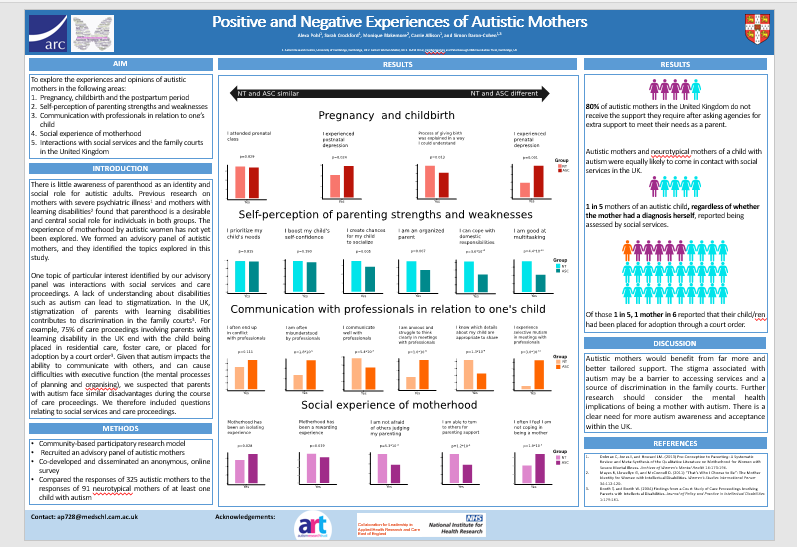Autistic Motherhood Research
When Research Meets Autistic Advocacy & Human Rights
“It is not child protection it is institutionalised discrimination. It is a human rights violation and our children have been, and are, being stolen without apologies and without the systemic change required to support our family units”.
M.Blakemore, United Nations 12th June 2025, Numbers Don’t Lie Side Event at Conference of State Parties (CoSP)

When I began helping families across the United Kingdom secure the right educational support for their children, I started to notice something deeply troubling.
So many of the mothers I supported showed clear signs of being Autistic, though undiagnosed. And far too many were pulled into child protection proceedings. Despite their struggles, none of these women had an adult social worker to assess their needs as disabled mothers. At the very moments when their families were most at risk, the services that should have been supporting them were nowhere to be found.
My role became whatever the family needed: arranging autism assessments, helping mothers understand the child protection process, explaining legal documents in ways that made sense, supporting solicitors who often had little knowledge of autism, and sitting alongside mothers in court as they faced their darkest fears. Too many times, I was left arranging welfare checks and hoping that each mother had the strength to carry on fighting.
Out of that urgency, I wrote Human Rights Violations Against Autistic Mothers, a report I submitted to the United Nations Office of the High Commissioner for Human Rights (OHCHR) for their 114th Session in 2015. It was written because I couldn’t be everywhere at once but a document published on the UN website could be carried into meetings, forcing services to stop, think, and reflect. Since publishing I have been contacted by thousands of mothers from around the world over the past ten years.
For some, the report was the first time they realised they were not alone. Mothers who had their children forcibly removed told me that, in reading my words, they finally saw their own experience reflected and understood. They gained strength to adapt, learn and fight to keep their families intact.
Others reached out not for help, but simply to share their stories with someone they trusted would understand. They wanted their experiences witnessed, their voices heard. And then there were those in the midst of crisis who were desperate, terrified, and reaching out for guidance and support as their family lives were under immediate threat.
Now, a decade on, I am beginning to hear from families whose children who have aged out of the care system. But with those reunions come new and complex challenges with trauma, separation, and systemic failure that cannot simply be undone.
The stories I’ve heard are a constant reminder of why this work matters: because behind every policy, every report, every statistic, there are mothers and children whose lives are forever shaped by the failures, or protections, of the systems around them.
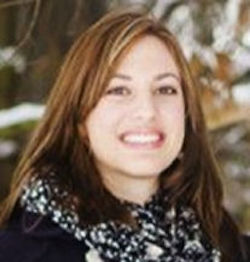
In my advocacy for Autistic women, I began communicating with Alexa Pohl, who at the time was a postgraduate researcher at the Autism Research Centre at Cambridge University. Her work focused on the higher rates of PCOS and the lower diagnostic rates among Autistic women. During The Autism Show in Manchester, Alexa introduced me to Professor Sir Simon Baron-Cohen. We spoke about the experiences of Autistic mothers, particularly around child protection and the removal of children, as well as the survey I had completed for the Department of Health for the National Autism Strategy — though looking back, I wish I’d asked better questions. From that meeting, it was agreed that my NGO, Autism Women Matter, would partner with the Autism Research Centre to research the experiences of Autistic mothers.
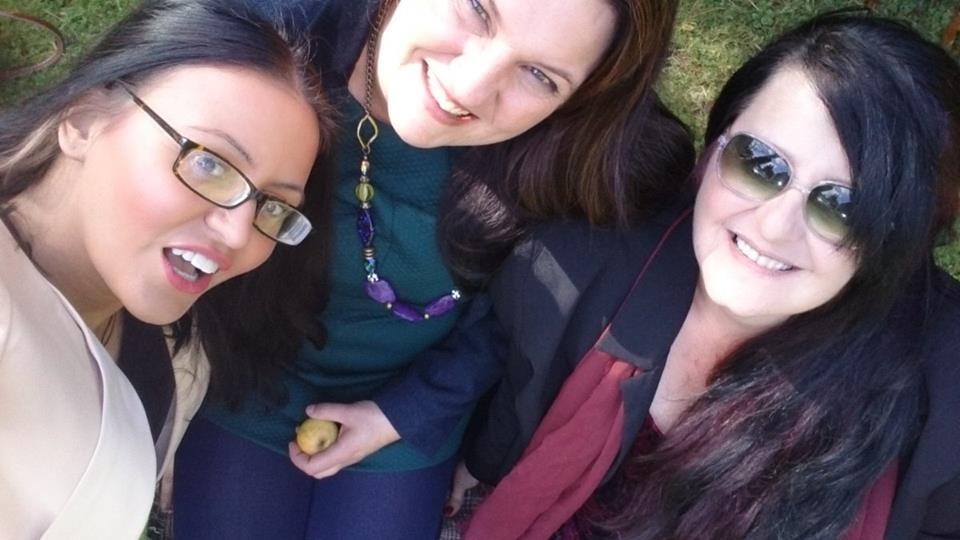
At that first meeting with the researchers, I invited Willow Caroline Holloway and Carly Jones to attend. Later, the ARC researchers formed a panel of Autistic mothers who brought a wealth of lived experience and insight. The team included myself, Lana Grant, Joanne Limburg, Tracy Turner, Kellie Howes, and Carly Jones.
The panel contributed to identifying the study objectives and in the design of the survey, disseminated the survey and, once the data was collected, provided input on the interpretation of the qualitative results. Following best PPI practices from the National Institute for Health Research (NIHR) UK, all panel members were reimbursed for their time and travel

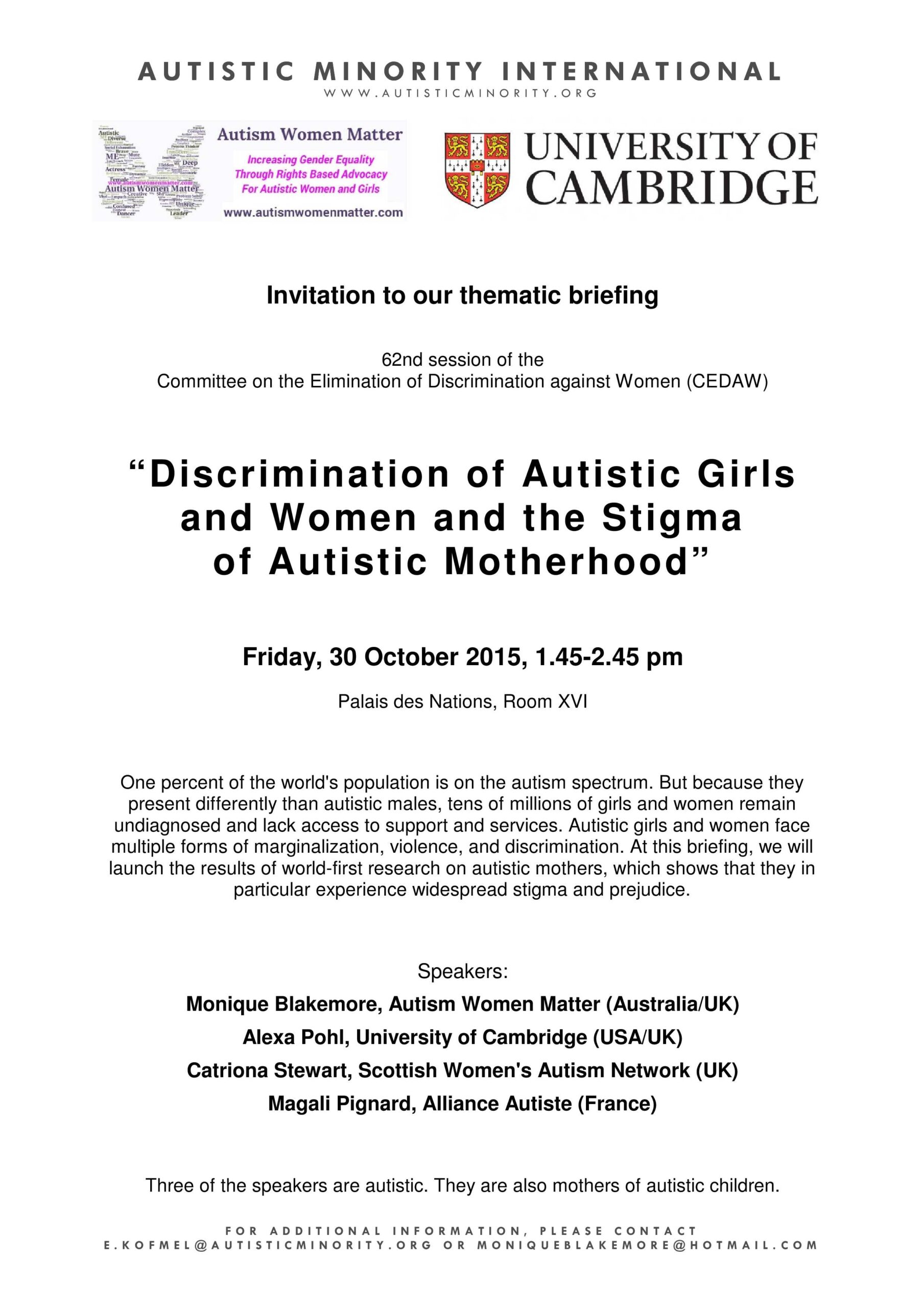
Before the research was published, there was an advocacy opportunity where researchers and Autistic advocates could work together to support Autistic mothers. I organised, together with Erich Kofmel from Autistic Minority International, a thematic briefing (a focused discussion on a specific issue) with the Committee on the Elimination of Discrimination Against Women (CEDAW). This led to further after-hours discussions with the Chair, Co-Chair, and Special Rapporteur at the United Nations in Geneva, Switzerland.
Our research preliminary results, Positive and Negative Experiences of Autistic Mothers was a world first looking at how social services intervenes with Autistic families. Dr Alexa Pohl presented at the International Meeting for Autism Researchers (IMFAR) in 2016 at Maryland, Baltimore, USA. To read the research please click on the graphic.
De Dena Gassner arranged a Special Interest Group (SIG) at IMFAR 2016 inspired by the way researchers worked with me and how we collaborated in advocacy. Alexa Pohl presented, I was unable to secure funding to attend, with a panel that included Dena, Stephen Shore and John Elder Robison. The event was titled Incorporating Autistic Intellect Into Research on inclusive research practices.
Published in 2020 this research has now had over 57,000 article accesses and cited over 117 times in other journals leading the way in how Autistic mothers are understood. To read the research please click on the graphic.
Our findings demonstrate that there are aspects of parenthood which Autistic mothers find more difficult than non-autistic mothers and critically, these included difficulties in communicating with professionals, negative perceptions of their mothering, such as fear of judgement of their parenting skills by others, and high rates of postpartum depression. In addition, there are challenges unique to being an Autistic parent, such as deciding when not to disclose their autism. We also identified positive aspects of motherhood and that, for an overwhelming majority of Autistic mothers, parenting was overall a rewarding experience.
Fear of judgement from others may be linked to interaction difficulties, where over 40% of Autistic mothers found speaking to professionals was so anxiety inducing they were either unable to think clearly, or experienced difficulties in communication. Furthermore, perceived stigma and fear of being viewed as a ‘bad parent’ might deter Autistic mothers from asking for much needed tailored support. If Autistic mothers are less likely to approach other parents or professionals for advice and emotional support, this could create a vicious cycle whereby parenting difficulties may become overwhelming, leading, for example, to feelings of isolation. It is important to ensure that there is a broader understanding of the challenges associated with being an Autistic mother among professionals. By furthering professionals’ understanding and awareness, this will hopefully decrease stigma associated with autism, which may be preventing Autistic mothers from disclosing their diagnosis. We also hope that it will help ensure that Autistic mothers are able to receive the support they require and effectively advocate for their children.
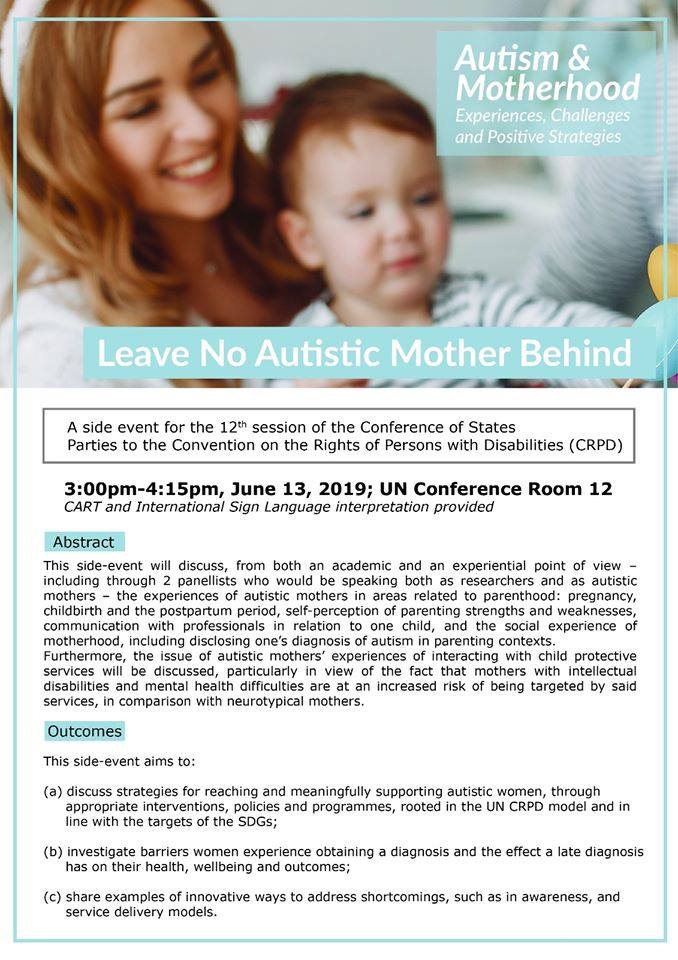
Working with Dr Alistair de Gaetano, we co-produced a panel discussion at the 12th Session of the Conference of States Parties (COSP) to the United Nations Convention on the Rights of Persons with Disabilities (CRPD), held at the United Nations Headquarters in New York. At this event, titled ‘Leave No Autistic Mother Behind’, was the first session at COSP to center the lived experiences, rights, and challenges of Autistic mothers.
Co-produced and Co-sponsored by the Government of Malta the event was also sponsored by the Australian Federation of Disability Organisations, and hosted in partnership with Autism Aspergers Advocacy Australia. The event gathered international experts, researchers, and advocates to examine the systemic barriers autistic mothers face particularly in healthcare, child protection, and diagnostic services.
- Hon. Anthony Agius Decelis – Juniors minister for Persons With a Disability & Active Ageing, Malta Government
- Rhoda Garland – Executive Director, Commission for the Rights Of People with a Disability, Malta
- Connie Laurin-Bowie – Executive Director, Inclusion International
- Claire Azzopardi Lane – Member of Malta Autism Advisory Council
- Sarah Crockford – Researcher at Autism Research Centre, Cambridge University
- Dena Gassner – Director, The ARC-USA and Adjunct Professor at Towson /university
- UN-DESA provided a speaker
Mothers of Autistic Children: A study of their experiences with child protection social services and allegations of fabricated or induced illness. To read, please click the graphic.
We concluded that 1 in 5 mothers of Autistic children in the UK are investigated by social services for child welfare concerns. We found FII allegations against mothers of Autistic children were much higher than the incidence of FII in the general population. There was no variation by maternal diagnosis in any stage of child protection investigations.
We call for international data on the prevelence of Autistic children under protection so that governments with outlying rates of Autistic children in protection can investigate their practices for bias.
Child protection is a pervasive yet woefully understudied topic in autism, and we look forward to exchanging ideas with physicians, psychologists, health visitors, nurses, social workers and educators working in child protection.
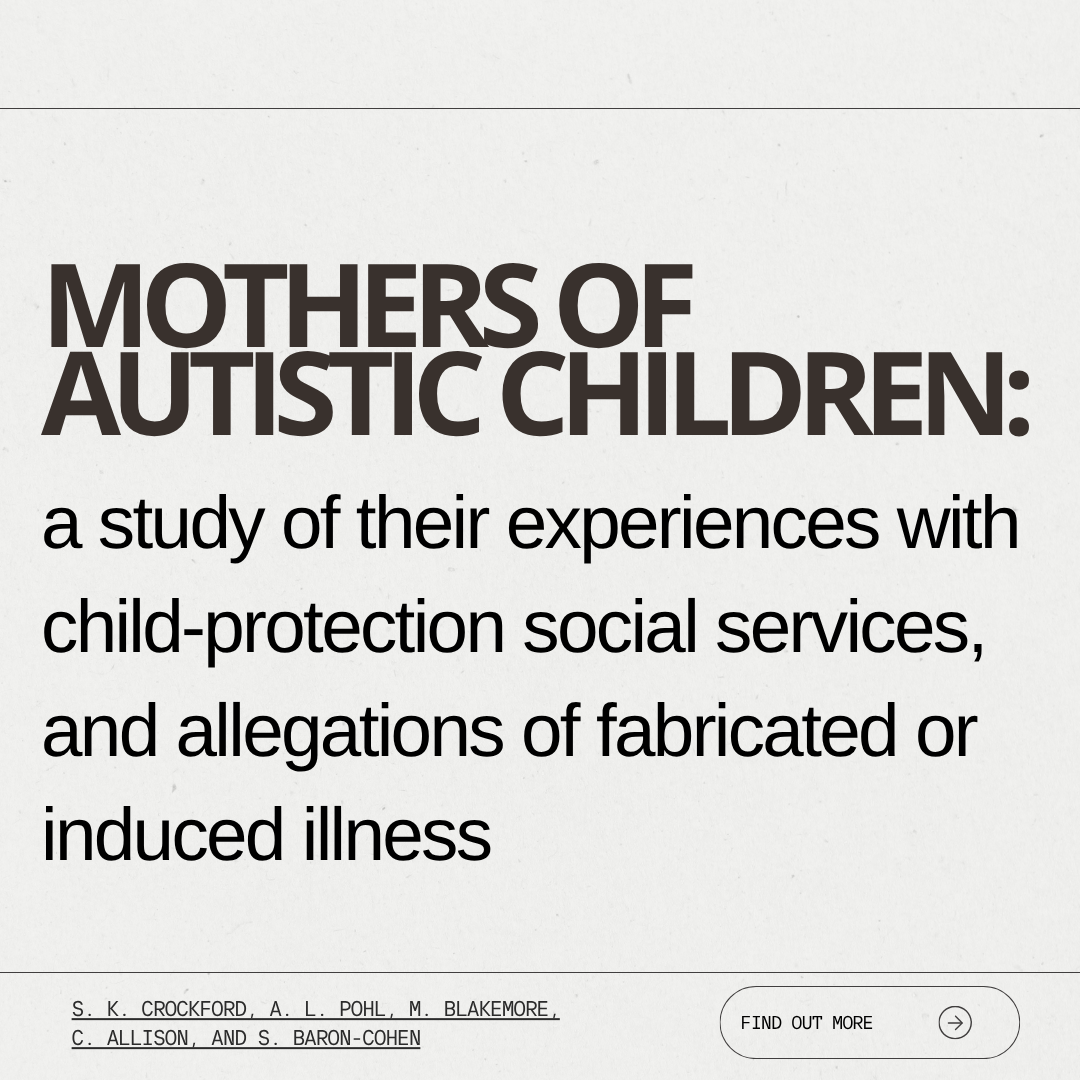
Sub Heading
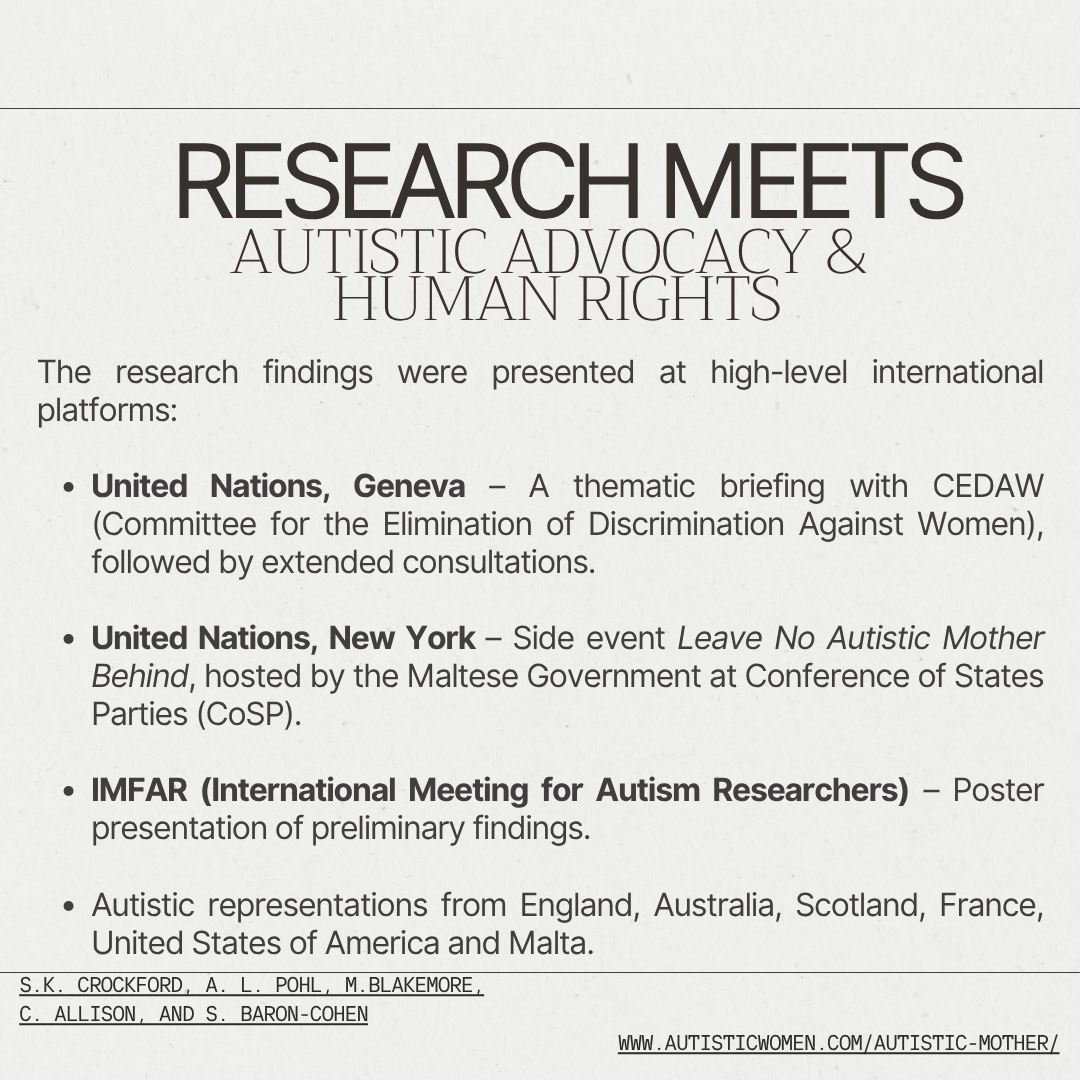
Sub Heading
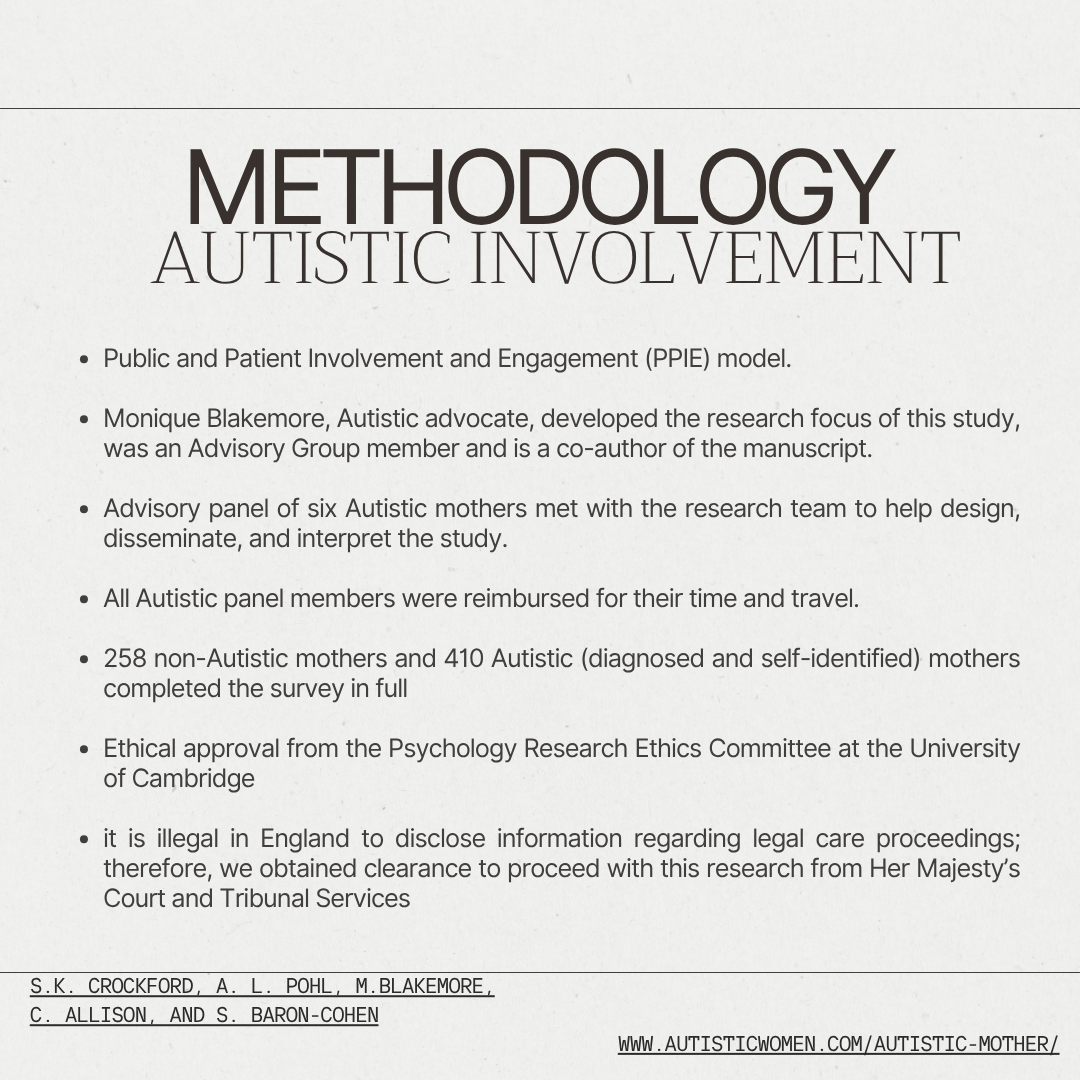
Sub Heading
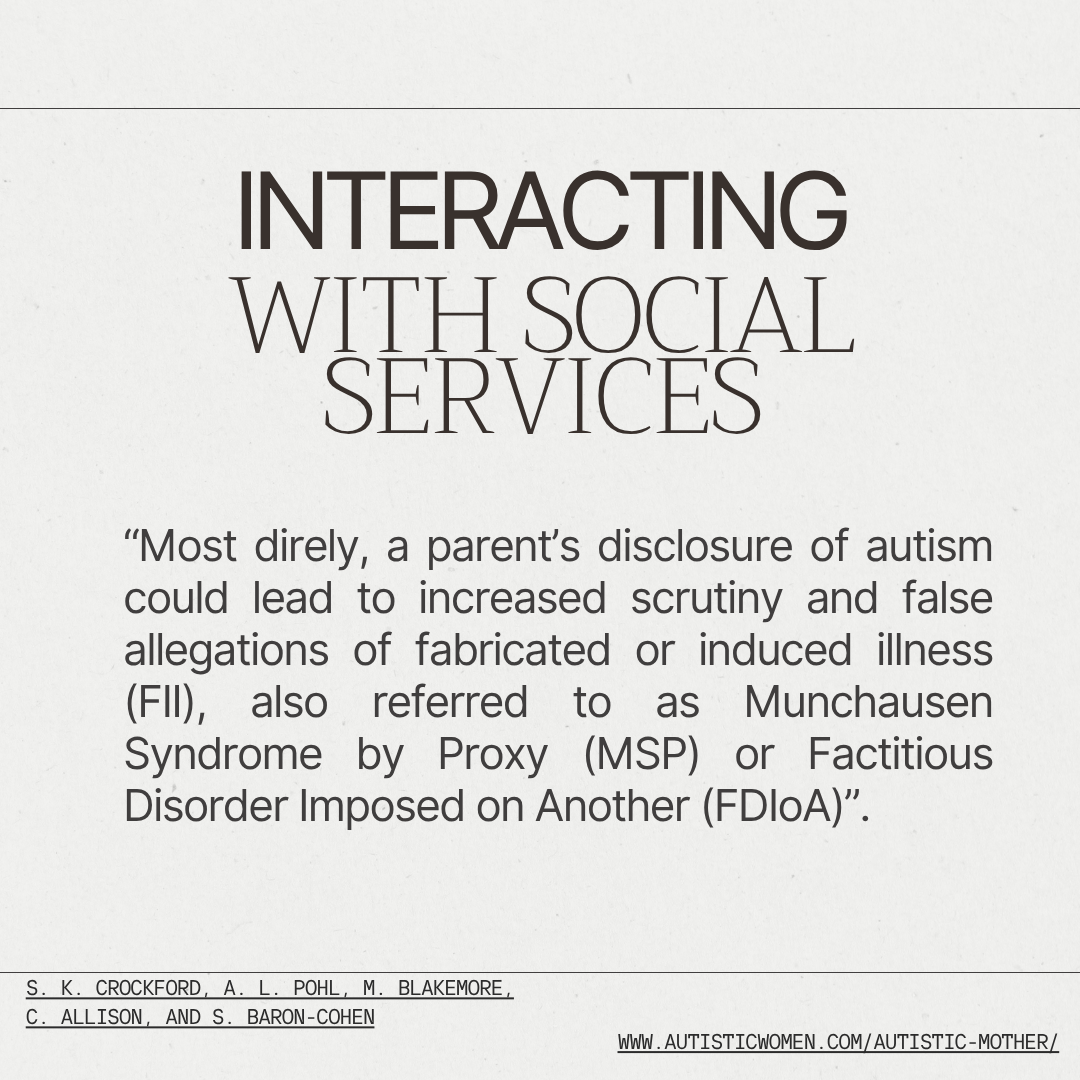
Sub Heading
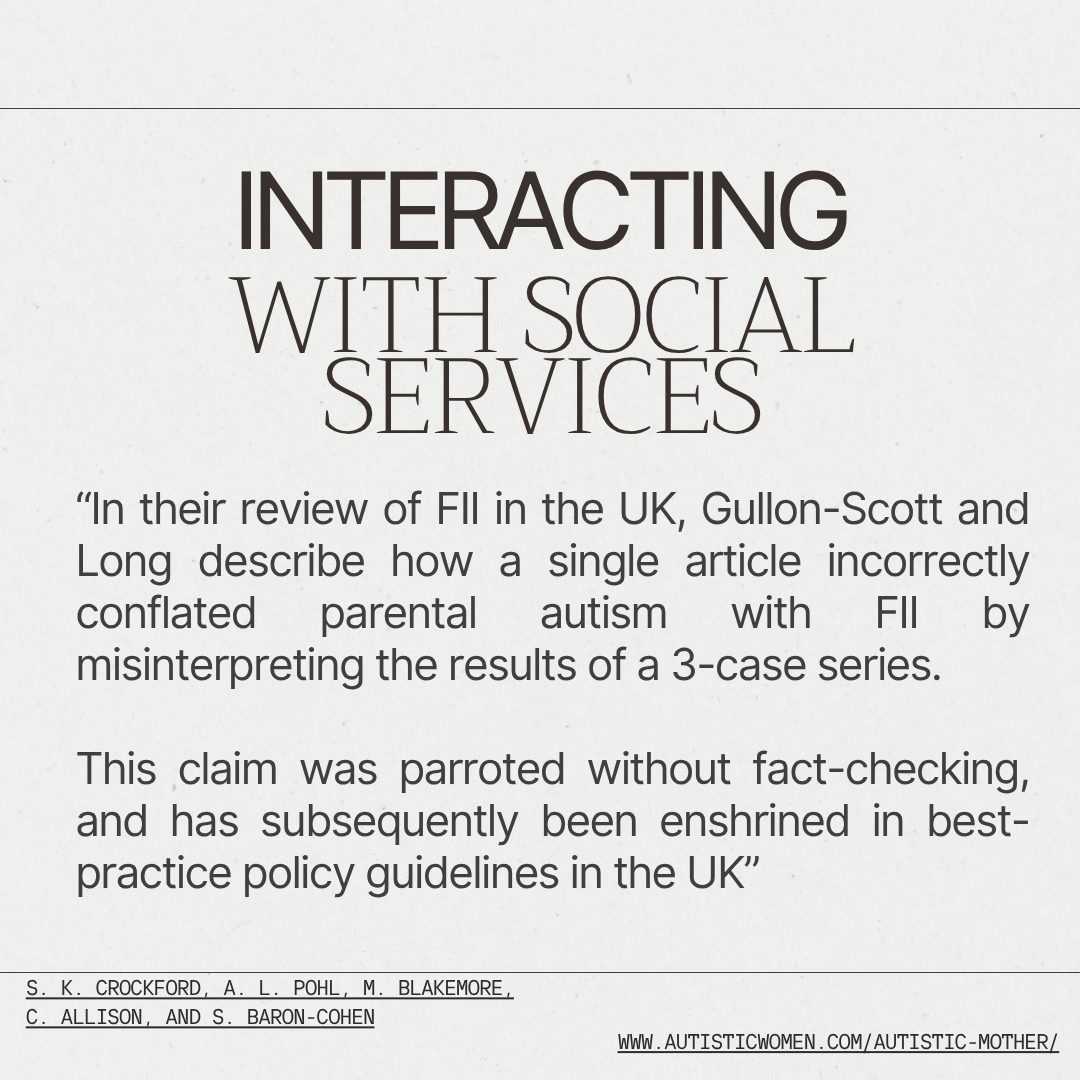
Sub Heading
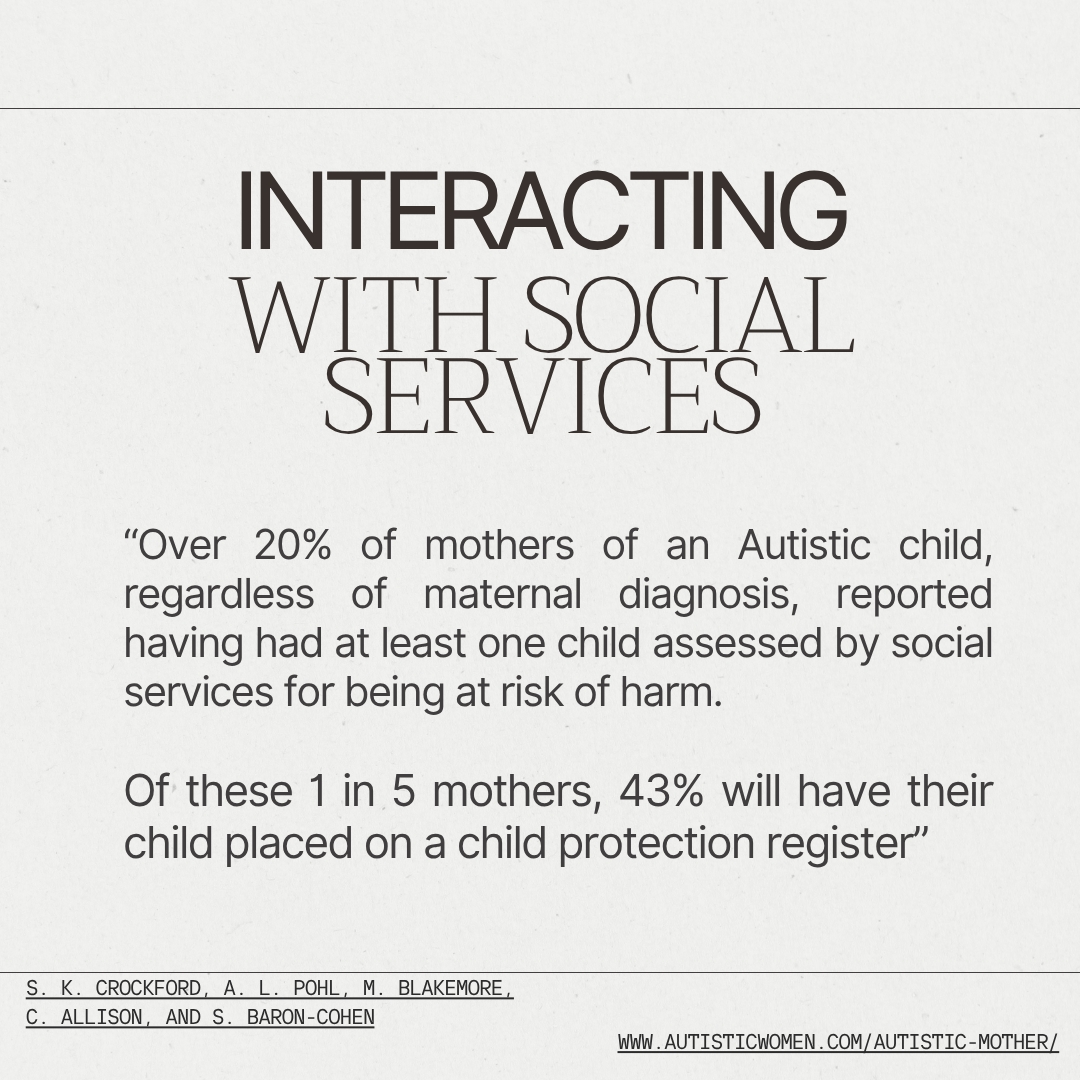
Sub Heading
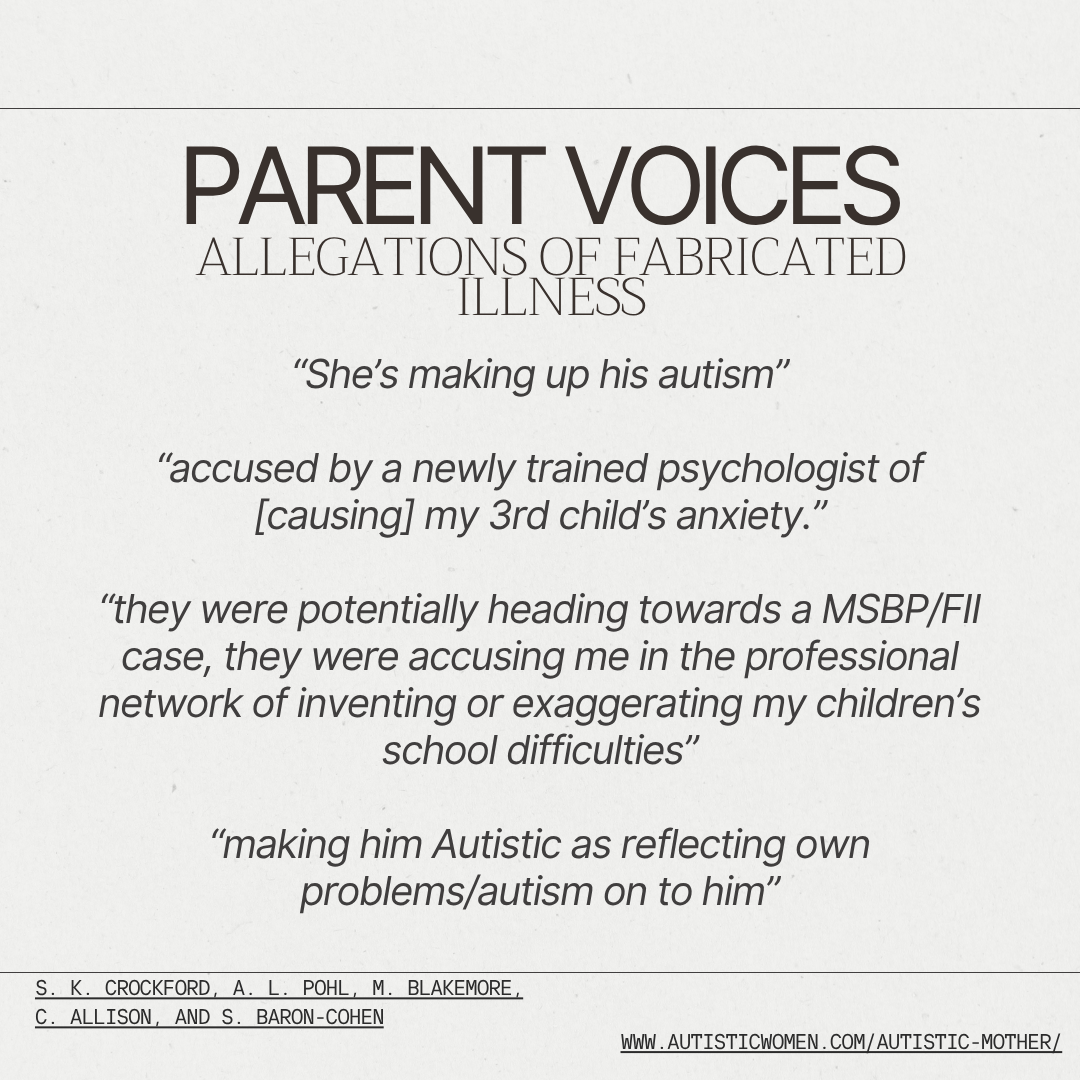
Sub Heading
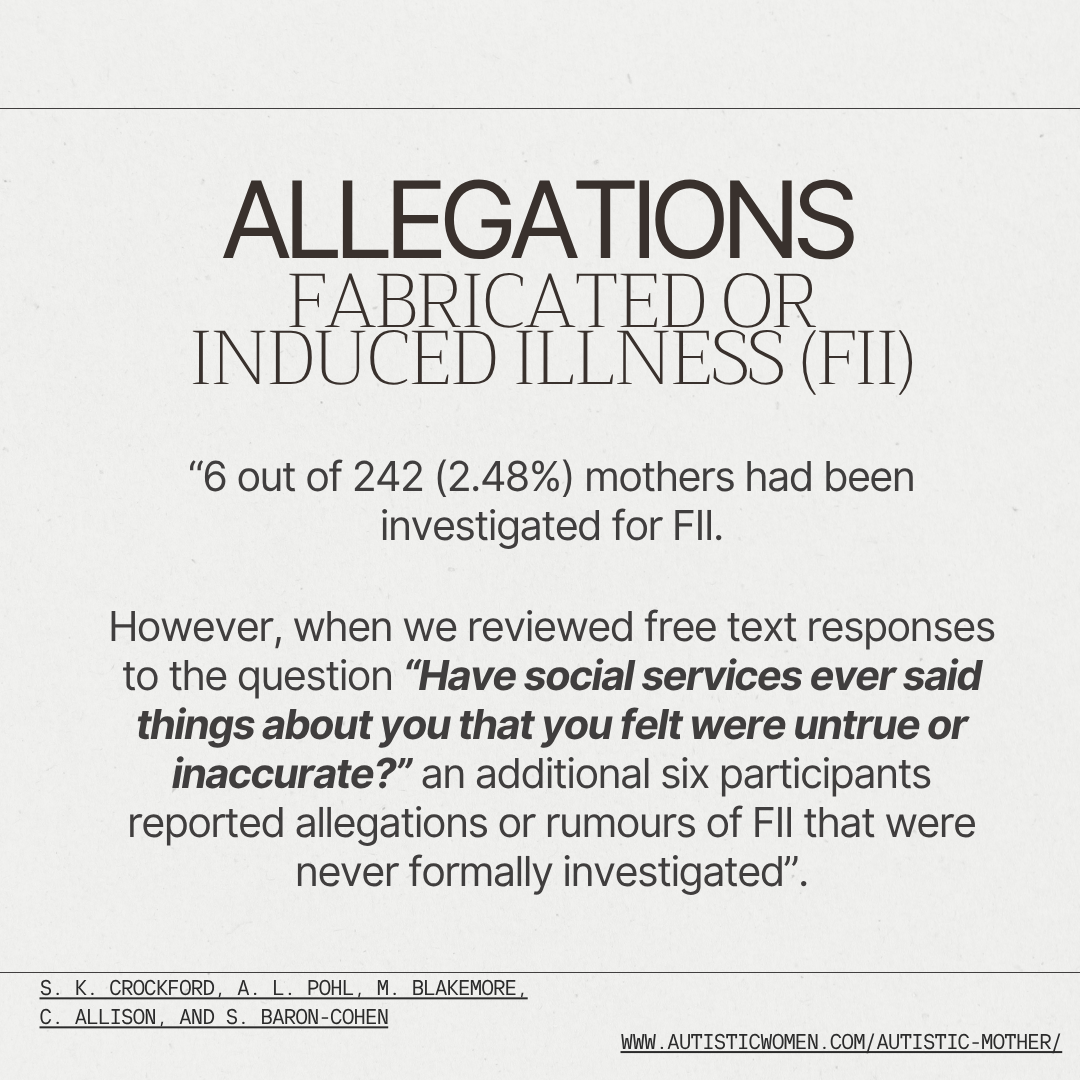
Sub Heading
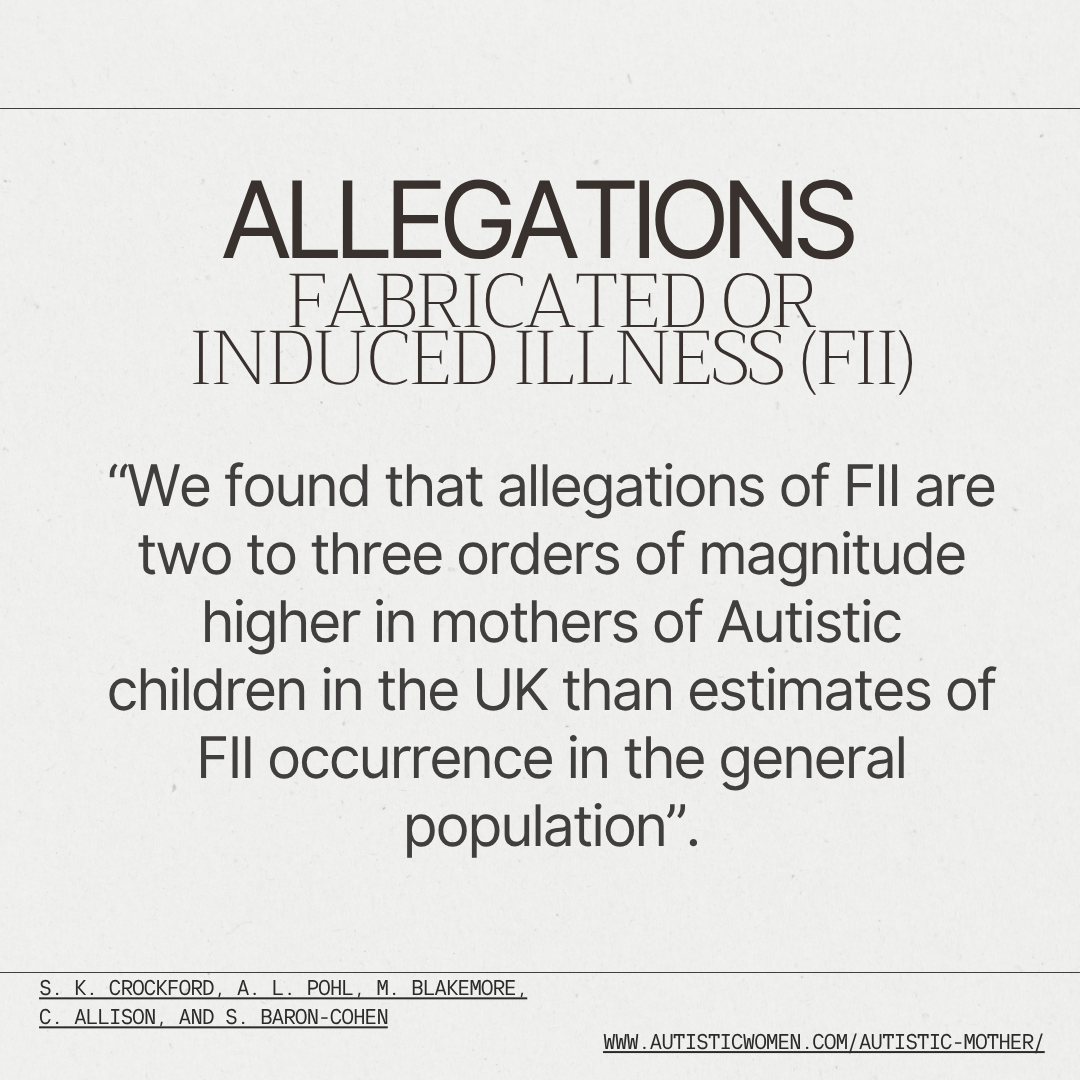
Sub Heading
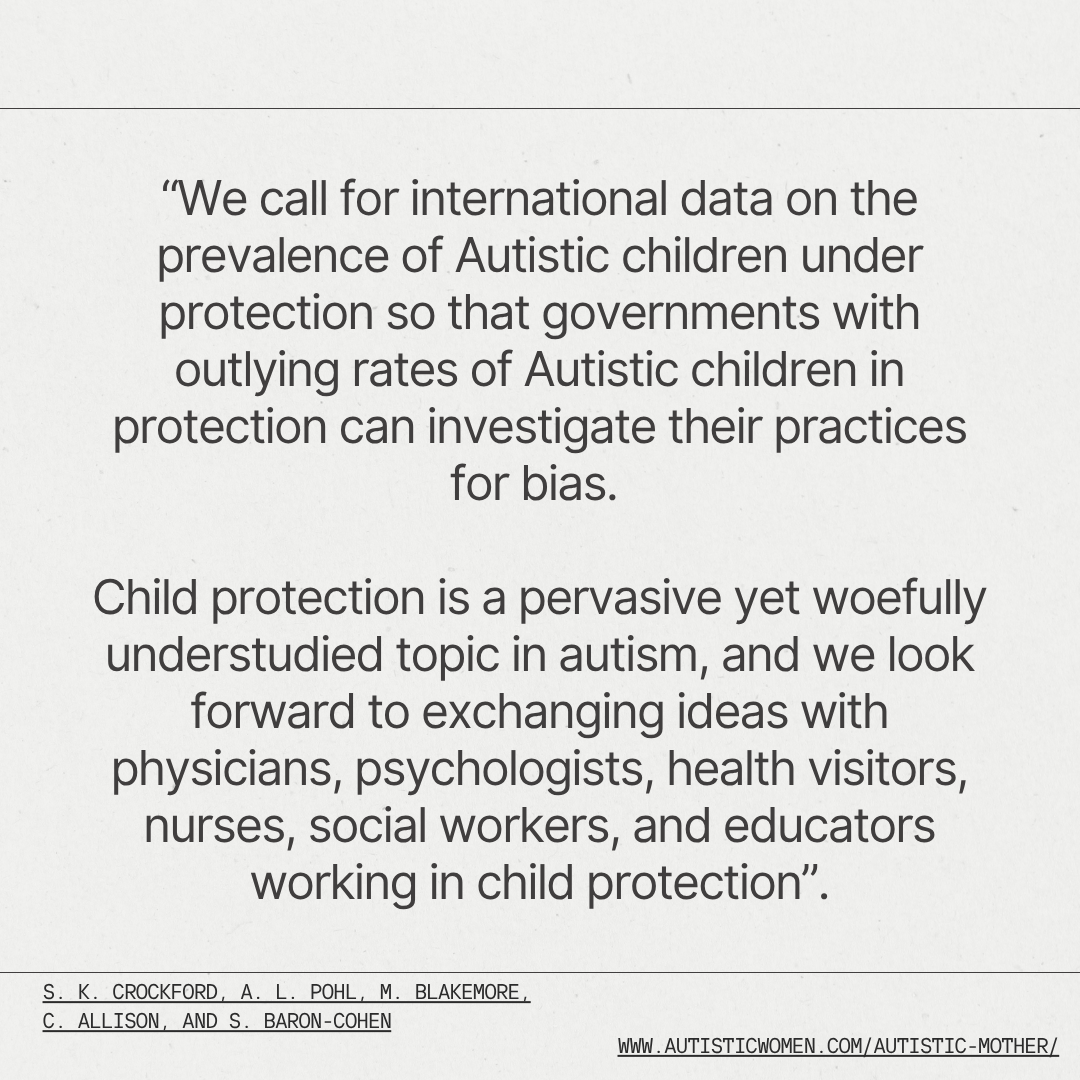
Sub Heading

